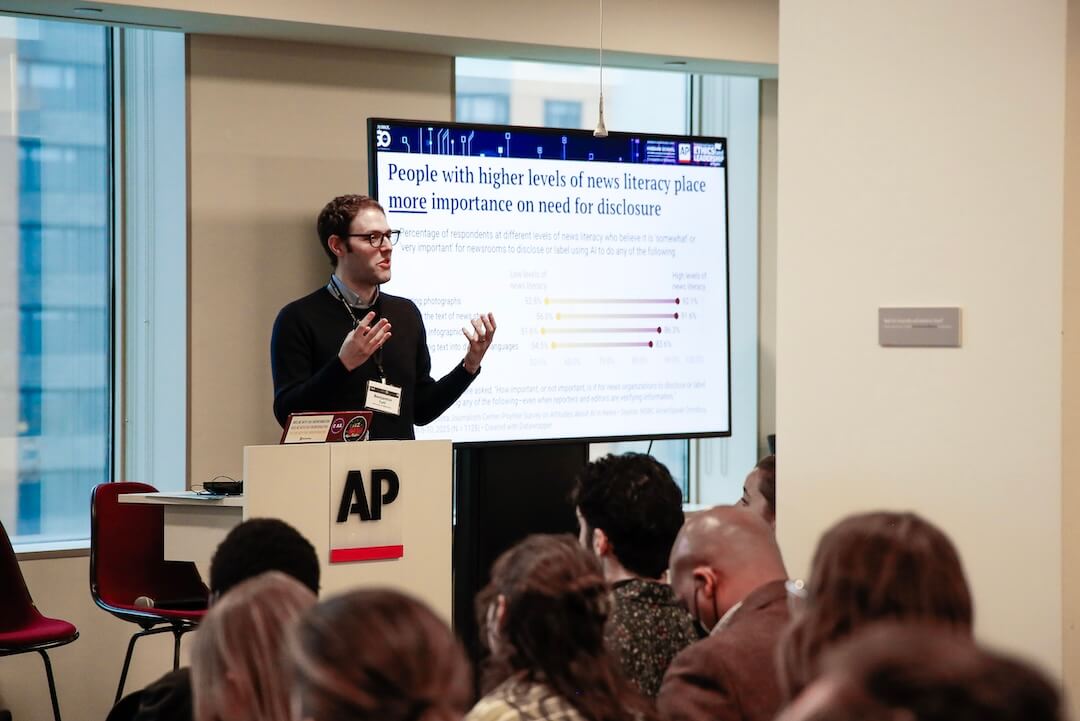Private messaging apps like WhatsApp have always presented challenges for fact-checkers. Unlike Facebook and Twitter, where fact-checkers can use third-party software to track the virality of misinformation tropes, WhatsApp’s end-to-end encryption keeps messages private between sender and receiver.
But a combination of a strong community and automation is helping Spanish fact-checking organization Maldita.es track and combat the spread of misinformation on WhatsApp. Maldita first added an automated chatbot to its existing WhatsApp tipline in July 2020 to help keep up with increased demand from the COVID-19 pandemic.
Co-founder and CEO Clara Jiménez Cruz said Maldita’s community helped her organization flag both private and group messages that may contain misinformation.
“You need to have people that trust you and believe in you and are willing to send you whatever piece of misinformation arrives to their cellphone, so you can fact-check it for them,” Jiménez Cruz said, adding that it’s crucial for fact-checkers to include their audiences as allies to flag misinformation on messaging apps.
Jiménez Cruz also said adding an automated chatbot to her organization’s existing WhatsApp tipline both improved response times to users and enabled Maldita to build a database to track different misinformation trends. The bot uses language analysis to match fact-checking requests with Maldita’s existing catalog of articles. It also has an option for a Maldita staffer to jump into an individual chat if the bot makes a bad match or it’s otherwise requested by the user.
“It gives straightforward answers to the users when in the past it would maybe go without an answer for weeks,” she said. Prior to automating the chatbot, a single Maldita staffer would be responsible for responding to an average of 200 to 300 fact-checking requests per day. This number ballooned to an average of 950 daily requests during the pandemic.
“We were failing our community, and we were failing ourselves because we weren’t able to get the pieces of information we needed to understand what was going viral in these private conversations,” Jiménez Cruz said. By automating its WhatsApp tipline, Maldita was able to organize incoming messages into a searchable database it could use to analyze and track misinformation trends.
Maldita used this database to analyze more than 8,000 fact-checking requests its chatbot received between March 5 and April 4. It found that frequently forwarded WhatsApp messages — those forwarded between users five or more times — were three times more likely to contain misinformation than other types of messages. The report recommended that fact-checkers prioritize these types of messages when looking to fact-check claims from WhatsApp.
“This can help fact-checkers with smaller operations be able to prioritize,” Jiménez Cruz said. “I think it can also serve as an alert that something might be very viral the minute you get the first frequently forward message.”
[the_ad id=”667872″]
WhatsApp first rolled out labels on frequently forwarded” messages in July 2018 in the hopes that alerting users would slow the spread of misinformation. It had a limited impact, so the platform introduced new restrictions in January 2019 limiting the amount of forwards to five users before revising that number down to one user in April 2020.
A 2019 study published at the Federal University of Minas Gerais in Brazil found that limiting the number of forwards to five users had some measurable effects, however, the impact was limited for highly viral content. Both WhatsApp and its parent company Facebook have pushed back on these kinds of studies in the past, arguing the sample sizes used were not representative of the entire information ecosystem on the platform.
“This latest change resulted in a 70% reduction in the number of these highly forwarded messages on WhatsApp,” a company spokesperson wrote in an email to Poynter. “We were pleased that Maldita was able to use data insights about messages to help inform their study, and we hope this will help their efforts. This represents a big step forward in our ecosystem’s fact-checking efforts, and we are committed to supporting them and other partners.”
[the_ad id=”667878″]
Maldita’s chatbot earned it the recognition of a 2021 European Press Prize for innovation, which includes a 10,000-euro monetary prize that Maldita can use to further the project. Jiménez Cruz said Maldita plans to use the chatbot for other messaging apps besides WhatsApp.
“You can automate the tipline on Telegram, Instagram, Twitter, Facebook, and as a webchat,” she said. “We have the development done and will be deploying it before July.”
She also noted more research needs to be done to see if highly forwarded messages could be used to signal active disinformation campaigns. The report pointed to a 24-hour period from March 21-22 where four previously fact-checked false claims about immigrants using government services and voting all started spreading virally around the same time. A similar pattern emerged a month after the study’s data collection was complete, but the study’s authors said more research needs to be done to confirm whether this is an indicator of a coordinated campaign.
Jiménez Cruz said she hopes the recent recognition by the European Press Prize will kickstart a wider conversation in Europe about how to tackle misinformation from private messaging apps like WhatsApp.
“I think we need to pay more attention to how WhatsApp misinformation thrives and affects people and democracies,” she said. “It (has an impact) in Spain, it does in South America, we know it does in India, but I think in other European countries we’re not talking so much about it and we should.”







